If you have been following this site’s private equity coverage over the years, you will have noticed how the industry has been salivating over the possibility of getting retail dupes to invest in their funds. Mind you, this push was underway years ago, even as leaders, at the very same time, were warning that returns were set to fall.
Things have gotten even worse as funds are unable to sell their doggy portfolio companies, and have been resorting to much-hated gimmicks like continuation funds to try to finesse the problem (more on that soon). That means that investors that needed to get money back on some reasonable time frame, particularly pension funds who have beneficiary obligations to meet, are having to resort to extreme measures like borrowing to pony up the funds.
The device that the new SEC chair Paul Atkins intends to use to let private equity pick individual investor pocket is by loosening accredited investor rules. They are intended to keep small fry who can’t afford to lose much money away from risky products with poor disclosures and super complex agreement that mask their “heads I win, tails you lose” provisions, like private equity and hedge funds. That’s before getting to the fact that the risk/return tradeoff now is worse than for public stocks (CalPERS shook the hedge fund industry by concluding that in 2014 and abandoning hedge funds altogether; private equity has not been outperforming stocks since 2006 yet it has higher leverage and illiquidity risks).1
Let’s turn the mike over to the Wall Street Journal for a summary of accredited investor rules:
Accredited investors must either have a net worth of over $1 million, not including their primary residence; or an income of over $200,000 individually, or a combined income of $300,000 with their spouse or partner, in each of the prior two years.
A million in net worth is not all that much, particularly if some of it is not liquid, like investments in real estate. Yes, some people in that cohort might be bright young things at a Goldman or a Davis Polk who could evaluate the risks….and would have picked up that buying complex products at retail is a mug’s game.
Recall that CalPERS estimated that private equity’s total fees and costs were 7%.1 That is a simply staggering level. No wonder the fund limited partners are getting more and more unhappy over time. The gross returns of private equity returns of private equity may be high enough to justify the existence of this investment strategy, but not after the general partners’ grifting.
And without belaboring how exactly the retail investor will get his share of private equity, going through another vehicle will mean more fees and costs, further depressing net returns. For institutional funds of funds, fees are prototypically 1% per annum and 10% of the upside. Why should retail get better terms?
And the excuse for considering this move is bogus. From the Journal:
“Allowing this option could increase investment opportunities for retail investors seeking to diversify their investment allocation in line with their investment time horizon and risk tolerance,” he [Atkins] said at the conference in Washington.
Oh, come on. Hedge fund returns have become highly correlated with those of stocks, so adding them to a portfolio does NOT create diversification.
Similarly, the pretense that private equity returns are not tightly correlated to those of equities is an artifact of bad accounting. First, private equity funds report their results late, typically at least a quarter after the reporting dates of the underlying companies. Once you correct for that alone, private equity and public stocks track together. The tight correlation would become even more exact if the other accounting con were abandoned, that of “smoothing” or under-reporting the fall in valuation, in bad equity markets.
Another way to confirm what a lousy idea this is for anyone outside the private equity industry is to look at the extensive work by the dean of quantitative analysis, Richard Ennis, on the performance of public pensions and endowments who invest in “alts” such as private equity, hedge funds, and real estate. For instance, from a writeup in 2023 of some key Ennis papers:
Over the years, this site and some important writers like Michael Hudson have written regularly about rentier activity and how it distorts economic performance and creates a parasitical elite. A new paper by finance maven Richard Ennis, who has been systematically analyzing the performance of high-fee so-called alternative investments, shows that they systematically fail to deliver on their promise of superior returns. And the huge amounts of money involved produce an economy-wide drag, even before getting to the destructive effects of shifting more wealth to the top 0.1%, starting with cementing oligarchical control over politics…..
In earlier papers, Ennis documented that public pension funds have underperformed and that underperformance is due to these high-falutin’, big fee schemes. For instance, from a 2020 post New Study Slams Public Pension Funds’ Alternative Investments as Drag on Performance, Identifies CalPERS as One of the Worst “Negative Alphas”; Shows Folly of CalPERS’ Desperate Plan to Increase Private Equity and Debt and Go Bigger Using Leverage:
We are embedding an important new study by Richard Ennis, in the authoritative Journal of Portfolio Management,1 on the performance of 46 public pension funds, including CalPERS, as well as of educational endowments.
Ennis’ conclusions are damning. Both the pension funds and the endowments generated negative alpha, meaning their investment programs destroyed value compared to purely passive investing.
Educational endowments did even worse than public pension funds due to their higher commitment level to “alternative” investments like private equity and real estate. Ennis explains that these types of investments merely resulted in “overdiversification.” Since 2009, they have become so highly correlated with stock and bond markets that they have not added value to investment portfolios. From the article:
Alternative investments ceased to be diversifiers in the 2000s and have become a significant drag on institutional fund performance. Public pension funds underperformed passive investment by 1.0% a year over a recent decade…
For a decade [starting in 2009], stock and bond indexes have captured the return-variability characteristics of alternative investments in composites of institutional funds, for all intents and purposes. Alternative investments did not have a meaningful effect. The finding that the correlation between funds with significant alts exposure and marketable securities benchmarks is near perfect runs counter to the popular notion that the return properties of alts differ materially from those of stocks and bonds. That, after all, is an oft-cited reason for incorporating alternative investments in institutional portfolios. As we see here, however, alt returns simply blend into broad market returns in the context of standard portfolio analysis in the latter decade.
And all of this is before getting to the elephant in the room: that private equity performance had gotten so bad that total assets under management have fallen and new funds by established firms are having trouble rounding up new money. So dumb retail investors are to fill the gap?
An early May Financial Times article (admittedly a bit of a way into the piece) describes how private equity is not returning cash the way it used to:
But according to Bain & Company’s Global Private Equity Report, distributions as a percentage of net asset value have fallen from an average of 29 per cent in the period from 2014 to 2017 to only 11 per cent today. PitchBook estimates there are more than 12,000 US portfolio companies — around seven-to-eight years of inventory at the observed pace of exits. This is much higher than the five-and-a-half-year median exit time they’ve observed across the industry to date. When anticipated distributions fail to show up, investors need to look elsewhere for cash to meet capital commitments they’ve made to other private equity funds.
This article mentions, as we have elsewhere, investors going so far as to sell their stakes in private equity funds to generate needed dough. Because private equity is illiquid, those disposals are at a discount.
In a sign of how tarnished the image of the private equity industry has become, big investors have even started to criticize its practices in unvarnished terms. This historically is unheard of; private equity cultivated the allure of the exclusivity of its returns and created a velvet rope dynamic, making investors afraid of the possibility that they might not be allowed to invest. This is utterly backwards; the money is, or should be, calling the shots. But the Stockholm Syndrome dynamic persisted for decades until undeniably crap performance has broken at least some investors’ shackles.
The sheer frequency of negative stories in the Financial Time about private equity substantiates that the strategy is in trouble. The one we just cited is from May 3. We provided a tally of recent, and not cherry picked articles on May 6, in Billionaire Blasts Private Equity’s Continued Grifting as Performance Falls Further:
Private equity’s bind should prompt an investor rethink3 days ago — Private equity’s bind should prompt an investor rethink. Returns are likely to be lower in a world of weaker growth, higher interest rates …
Private equity goes ‘risk off’ as it pauses dealmakingApr 15, 2025 — Donald Trump’s tariffs are forcing private equity groups to pause their dealmaking and focus on managing their existing portfolio companies, …
Big investors look to sell out of private equity after market routApr 6, 2025 — The race to find liquidity signals that investors in private equity funds increasingly expect to receive few cash profits from their holdings …
Hedge funds > private equity4 days ago — After all, whenever private equity buys and sell companies, takes them public or issues bonds and loans to finance them it generates hefty fees …
Private equity industry shrinks for the first time in decadesMar 4, 2025 BE — Private equity fundraising dropped 23 per cent in 2024, with the industry drawing in $401bn in new assets — the weakest tally since 2020.
Pensions dim on US private equityApr 14, 2025 — CPPIB’s trepidation over investing in the US, in particular, is a huge blow to the private equity sector. The fund had close to $50bn of …
Can private equity meet public responsibilities? – FT ForumsTo say that opinions on private equity’s sustainability record are divided would be a wild understatement. When we polled FT Moral Money readers, respondents …
And from the May 6 account, the extension of the critique by by billionaire Nassef Sawiris:
Sawiris, who has invested parts of his fortune in funds at multiple buyout firms, said he and others who back private equity funds were frustrated with the lack of distributions in recent years. Firms have struggled to exit investments amid a post-pandemic slowdown in dealmaking and initial public offerings….
“[Investors] are so frustrated. They are telling them [buyout firms]: ‘I haven’t seen any returns, you haven’t returned any cash to me in the last five, six years’.”
Sawiris took particular aim at the use of “continuation funds” to recycle capital — a tactic whereby private equity groups, instead of selling an asset to another owner or publicly listing it, move the asset into a new fund where they still maintain control.
“Continuation funds is the biggest scam ever because you say ‘I cannot sell the business, I’m going to lever it again’,” Sawiris said.
Continuation vehicles have grown increasingly popular in recent years, surging about 50 per cent to hit a record $76bn last year, according to a report from investment bank Houlihan Lokey….
He also criticised private equity managers’ priorities, saying they were far more focused on raising capital for their investment vehicles than their portfolio companies’ operational performance.
“They’re spending 90 per cent of their time fundraising and 10 per cent managing the businesses,” he said. “They attend board meetings, have a board dinner and there’s a reason why they didn’t execute the plan.”
Ouch.
But more damning is the takedown in Bloomberg by the head of the Kuwait Investment Authority at the Qatar Economic Forum. While some sovereign wealth funds are seen as savvy, historically most have been dumb money, particularly the Middle Eastern ones. But many have taken in recent years to hiring highly professional staffs. This warning would likely not just be well heeded, but would confirm what many of these sovereign wealth funds had already concluded internally:
The head of one of the world’s largest sovereign wealth funds said the clock is ticking for private equity and joined the chorus of investors who’ve grown worried about the industry’s valuation practices.
The industry has struggled to return money to investors for years, said Sheikh Saoud Salem Al-Sabah, managing director of the $1 trillion Kuwait Investment Authority. While that’s mostly been due to a lack of deals and initial public offerings, Sheikh Saoud said some firms were underwriting deals at valuations that they would struggle to exit.
“Private equity is very troubled, I believe, especially in the large buyouts, venture capital and the rise of continuation vehicles — that’s a very worrying sign,” Sheikh Saoud said…
Other investors and regulators have flagged concerns about the valuation practices inside many private equity firms. The UK’s Financial Conduct Authority, which oversees Europe’s largest center for private markets, launched a sweeping review of appraisals in the industry last summer amid concerns about inconsistent practices.
“I would ask LPs to ask their GPs to let them show them their underwriting process and at what multiples have they been buying in their various vintages,” Sheikh Saoud said. “And if they refuse to show you, they’ve been doing something wrong.”
Shaud’s demand for more transparency around underwriting and valuation should sound perfectly reasonable. But the fact that investors have never gotten that for all these many years shows how severely cognitively captured the limited partners had become. If enough investor are fed up, they may finally force these long-overdue changes. One can only hope.
___
1 For those with the time and patience, this FT Alphaville piece gives a very fine historical summary, then looks at the claims that private equity outperforms, and shows why they are suspect.



























